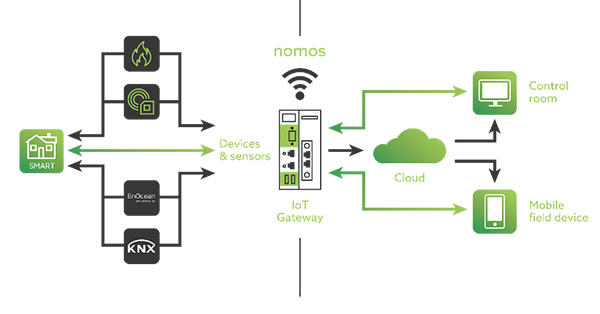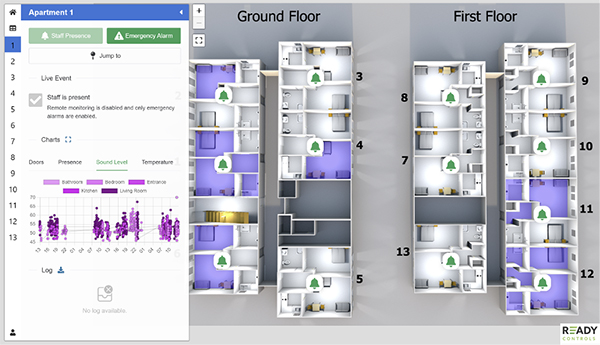
Simon Buddle explains how technology can help with the quality of care for the elderly, and why KNX is the ideal backbone.
Old age creeps up on the lucky ones. So many tragically die before their time, before they’ve experienced the joys and wonder of a fulfilled life. Wars, famines, or the ravages of climate change are the curse of many. I celebrated my 60th birthday earlier this year, officially old enough to get an Oyster60 pass that gives me free travel on London’s public transport.
The population is ageing, we are ageing, and soon we’ll need to be looked after. Each trip around the sun brings that certainty into ever sharper focus. Already I find myself searching for words in mind, I know they are there, floating just above my reach/memory but unavailable for use at the time I need them to be.

Human-centric lighting
KNX as a technology platform has vast capabilities in residential, airports, factories, MDUs, communal plant rooms, hospitals, the list goes on. To turn on and off a light is not so complicated. One might equally say that tuneable white is not such a complex problem from a control’s perspective. It is simply two different coloured lamps whose control signals are synchronised to turn them up/down in the correct ratios. But tuneable white light is far more complex in its abilities. It can wake us and relax us. Indeed human-centric lighting it has been proven to be important in healthcare and in the school classroom. For it to add value to our world however, it requires intelligence behind the tuning of the colour to ensure that it is done at the right speed and at the appropriate time. That is where the ‘controls’ truly come into their own.
Applying technology KNX to assisted living
Assisted living has for so long relied almost exclusively on caring staff, nurse call systems and basic access control to keep everyone safe and well. But imagine what could be done if you were to apply modern technology, some joined-up thinking, and KNX as the backbone for the infrastructure.
That is exactly what has happened in a new care home that is soon to open in Lancashire, UK. KNX provides the meat of the technology controlling lights, heating, blinds and all of the usual functions we’d associate with it. But overlayed on to this are a series of integrated sensors that are collecting data, signalling activity, and monitoring in real time the sounds, movements and presence of the service users. In turn this data is collated and analysed to improve the algorithms that alert staff to unusual activity. All of the data is aggregated onto a Nomos server.

The sound of footsteps is known by the system as an ordinary activity, whereas a patient falling triggers an alert, the ‘thud’ requires immediate staff intervention. Where are people any given moment? A graphical interface places their locations and shows the operation and status of doors, and pressure mats that locate people in beds. All of the data is aggregated onto the Nomos server.

What this technology means for the patients is a step change in their care. They have moved from reactive care to proactive care. No longer do they have to wait for someone to notice that they are missing and have fallen in their room, because this is instantly signalled to staff. As with any accident the speed of response is key to a successful outcome. In the elderly, this is amplified significantly.
This is a market sector using largely out-of-date technology. KNX provides a robust, modular and flexible backbone that can be adjusted to suit individual’s needs and can be easily updated (without a total rip out) as technology moves forward. One patient may benefit from tuneable white light, whilst another has no need. These types of change can be easily adopted into the system from the comfort of a remote office. No need to change any parts and no requirement for an expensive site visit.
Conclusion
For me there are three key take aways from the use of KNX within the world of assisted living.
1) It is easily (and therefore inexpensively) adaptable. Not everyone’s needs are the same, and KNX caters for this in a way that no other platform can.
2) It enables the care home and facilities managers to learn patterns and normal behaviours via the analytics, which in turn improves the healthcare provided.
3) It places the human at the centre of the alert system, massively increasing the speed with which people can receive help, and as a result, provides them and their loved ones with a greater sense of security that they are getting the very best care that can be given.
With an ageing population it is evident that we need to get better at implementing technology in this sector. Simply throwing more staff at the problem is not the solution, notwithstanding the colossal cost of such an investment. Technology is the answer, and we are well placed to provide it. If I have to live anywhere other than in my own home during my dotage, I know where I’d like it to be. As poet Dylan Thomas put it, ‘Do not go gentle into that good night. Rage, rage against the dying of the light.’
Simon Buddle CEng MIET, is a consultant for Future Ready Homes, a specialist in BMS and ELV services system design. www.futurereadyhomes.com












